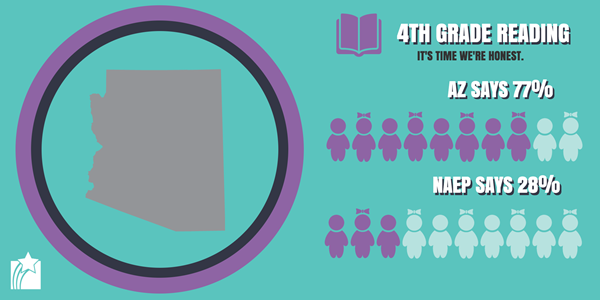TALLAHASSEE, FLA., Sept. 18, 2015 (GLOBE NEWSWIRE) -- Over the last five years, Arizona's education leaders have made courageous decisions to raise standards, create more rigorous assessments and raise expectations for student proficiency. The state is now emerging as a national leader in a tremendously important area: raising expectations for students.
"Arizona's tests used to paint a picture of overwhelming success – even when most students didn't have fundamental knowledge and skills in core subjects." said Patricia Levesque, CEO of the Foundation for Excellence in Education. "Now state academic assessments reflect reality rather than wishful thinking. Best of all, parents, educators, policymakers and the public in the state now have accurate information to make important decisions to improve instructional opportunities and learning for their students."
In 2013, Arizona's Instrument to Measures Standards (AIMS) assessments reported that most students were on track academically in math and reading. For example, 77 percent of fourth-grade students scored proficient on their AIMS reading test. But test results from the National Assessment of Educational Progress (NAEP) – a more accurate measure of proficiency – revealed a different story. According to NAEP, only 28 percent of Arizona fourth graders were proficient readers in 2013. This "proficiency gap" of 49 percentage points indicated Arizona was setting the bar far too low, giving parents and teachers an inflated, unrealistic view of student academic achievement.
In the spring of 2015, Arizona students took the new, more challenging test – the AzMERIT. Now when students earn passing scores, it means they have an in-depth knowledge of the subject and will be prepared to enter college or begin a career following high school graduation. With AzMERIT's more rigorous expectations, the percentage of students passing the state tests is aligned to results from NAEP. These new results don't mean scores have plummeted or students know less than past years. It simply means the state is finally being honest about how well students are doing.
"Honesty can be hard to take, but responding to it by insisting on school quality is the only way to ensure that students are prepared to choose the direction of their lives," said Lisa Graham Keegan, executive director of A for Arizona. "We are grateful that Arizona's state board has set honest performance levels on our new state test."
Each state sets its own academic requirements for reading and math, and each sets its own passing scores on state tests to determine if students truly are proficient in the subjects. Arizona has shown what can happen when a state chooses to use these assessments as an honest critique of students' academic progress.
Visit WhyProficiencyMatters.com/Arizona for more facts, graphics and sharable content. Join the conversation online with the hashtag #ProficiencyMatters.
A photo accompanying this release is available at: http://www.globenewswire.com/newsroom/prs/?pkgid=36217
